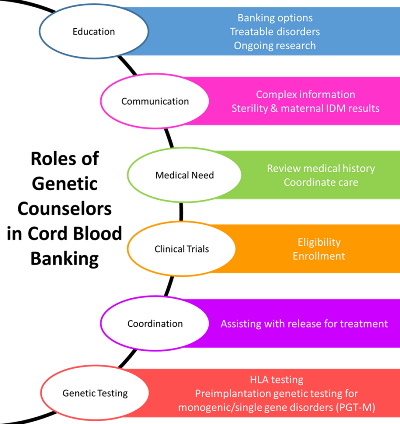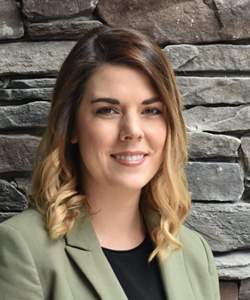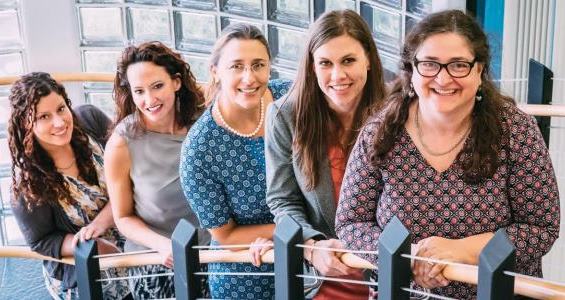You are here
The Role of Genetic Counselors in Cord Blood Banking and Stem Cell Therapy
 Since the first cord blood transplant in 1988, cord blood stem cells have been used to treat many genetic disorders including some cancers of the blood and immune system, hemoglobinopathies like sickle cell disease and thalassemia, immune disorders like SCID, and inborn errors of metabolism.
Since the first cord blood transplant in 1988, cord blood stem cells have been used to treat many genetic disorders including some cancers of the blood and immune system, hemoglobinopathies like sickle cell disease and thalassemia, immune disorders like SCID, and inborn errors of metabolism.
Although families have been privately banking cord blood for over 20 years, genetic counselors have had limited roles in the industry until recently. But as stem cell therapies advance and more families consider banking stem cells for therapeutic options, the role of genetic counselors becomes more important as a liaison between parents and clinical trials.
Certified genetic counselors (CGC) are healthcare professionals who have advanced training in medical genetics and in counseling. Using these skills, they are able to guide and support patients and families through the process of making healthcare decisions. Cell therapy using multiple cell types, including cord blood, is currently in various stages of clinical research and development. Due to the complexity of this evolving landscape, families may benefit from guidance on cord blood storage and clinical options. Patient-centered counseling approaches offered by CGCs can fill this current void.
CGCs in the stem cell industry have the opportunity to educate patients about public/private banking options, counsel high risk families about current and future uses of stem cells, and identify potential stem cell transplant recipients. In addition, families who are navigating their clinical trial opportunities may benefit from working with a specialized CGC who can provide education and information about treatment options, participate in eligibility screening, and discuss potential risks and benefits of participating in research studies. CGCs in this field may also implement education tools, review family history, deliver test results, coordinate clinical trial consent/enrollment, and facilitate genetic testing such as HLA typing.
CGCs can help families understand ethical issues that may arise in the process of participating in stem cell research. As with any experimental intervention, it is essential that patients participating in trials recognize the potential risks and benefits of the therapy. Many of the conditions being studied have no cure or effective treatment and managing expectations based on the current and limited experience with stem cell therapy in humans is essential.
CGCs also talk to families that are considering clinics which offer stem cell therapies without regulatory oversight or the ability to collect clinical data regarding treatment outcomes. Families could benefit from guidance in navigating these scenarios. With expertise in patient-centered counseling, CGCs have an ideal background to help ensure that families are empowered to make informed decisions.
Furthermore, CGCs serve as an important resource to their colleagues in healthcare. Patients often ask their personal physician about stem cell therapy, as well as the benefits and limitations of both private and public cord blood banking. CGCs with expertise in the field of stem cell therapy can continuously provide updated education about stem cell therapies to these healthcare providers so that they may better educate their patients.
With the growth of the private cord blood industry, evolution of the public banking system, and expansion of stem cell clinical trials, there is an increasing need to help families navigate this complex environment so that they can make informed decisions. CGCs are experts in communicating complex information, in facilitating the decision making process, and in the ethical issues surrounding stem cell research and should therefore be an integral part of the cord blood and stem cell industry.
For more information on Genetic Counseling, visit the National Society of Genetic Counselors at www.NSGC.org


References:
- Scott. The Case for Stem Cell Counselors. Stem Cell Reports. 2015 jan 13; 4(1): 1-6. doi: 10.1016/j.stemcr.2014.10.016
- Kirkpatrick et al. Stem cell research and therapy: the position of the National Society of Genetic Counselors. J Genet Couns. 2013 Aug; 22(4):407-10. doi.org/10.1007/s10897-013-9572-8
- Zierhut and Schneider. Stem cell Transplantation: Genetic Counselors as a Critical Part of the Process. Current Genetic Medicine Reports. 2014 June; 2(2):39-47. doi.org/10.1007/s40142-014-0038-6


